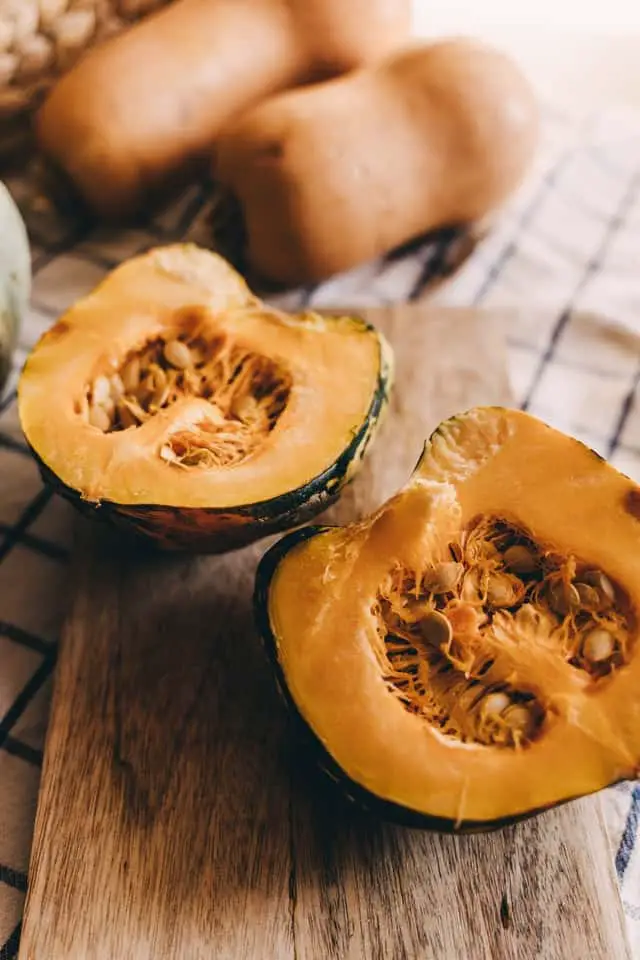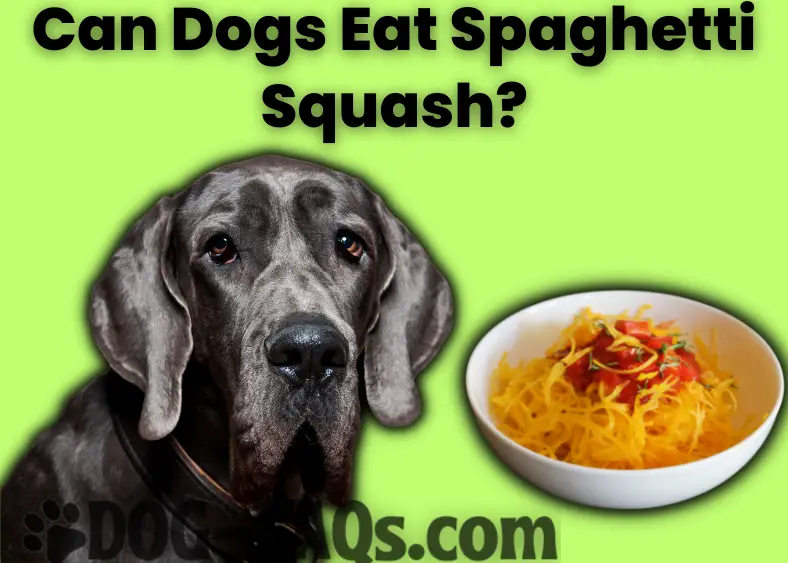Spaghetti squash comes with that cosy autumn flavor and smooth, nutty texture that we all can’t resist. As someone who loves to share their food with their pet, I thought it wise to research whether or not my dog can enjoy spaghetti squash with me. As I know many other concerned dog owners like me out there, I’ve decided to document my findings.
Ever wondered if it’s a good idea to feed your dog spaghetti squash?
As it turns out, it is! Dogs can eat Spaghetti squash; it’s completely safe for them. You can serve it side by side with a homemade meal. This gluten-free vegetable is rich in carotene, loaded with vitamins A, B6 and C, calcium, phosphorus, and potassium. All these nutrients have their part to play in aiding the body system function properly. Cook plain without spices, onions or garlic, and avoid adding salt, as it may cause dehydration. Serve in moderation, as too much could cause diarrhea in dogs.
Do note that there are specific guidelines to follow when feeding spaghetti squash to your dog. A lot of things could go wrong if these guidelines are not followed. In this article, I explain in detail everything you should know, the do’s and don’ts, health benefits, preparation procedure, and a lot more. Keep reading.
Nutritional Value of Spaghetti Squash
Spaghetti squash is packed with lots of nutrients and minerals. It’s low in calories and rich in the essential vitamins the body needs.
155 grams of cooked spaghetti squash contains fiber and other nutrients in the proportion below:
Dietary fiber: 2.2g
Protein: 1g
Calories: 42 kcals
Carbs: 10g
Fat: 0.4g
Cholesterol: 0g
Sugar: 3.9g
Vitamins, minerals and other nutrients
Sodium: 26mg
Vitamin C: 9% of the RDI
Vitamin B6: 8% of the Reference Daily Intake(RDI)
Manganese: 8% of the Reference Daily Intake(RDI)
Pantothenic acid: 6% of the Reference Daily Intake(RDI)
Niacin: 6% of the Reference Daily Intake(RDI)
Potassium: 5% of the Reference Daily Intake(RDI)
Folate: 3% Daily Value
Magnesium: 4% Daily Value
Vitamin A: 6% Daily Value
Copper: 6% Daily Value
Spaghetti squash also contains thiamine, calcium, magnesium, folate, and iron in small quantities.
Health Benefits of Spaghetti Squash
The health benefits of Spaghetti Squash include:
1. Dietary fiber
With 2.2g of dietary fiber and 42 calories per 155g (1 cup) of squash, it’s perfect if your dog is obese and you want its weight reduced. It decreases your dog’s overall calorie intake while ensuring that essential nutrients are provided.
2. Vitamins B3, B1, B5, and B6
These vitamins are crucial as they convert food into energy. They play a significant role in the metabolism regulation process of your dog. They also aid in stress relief.
Niacin helps secure the overall wellbeing of your dog’s brain, skin, and nervous system.
Thiamine helps the muscle, brain, and nerves perform properly.
Vitamin B6 helps regulate your dog’s appetite, mood, and sleep.
Minerals— Micro and Macronutrients
These minerals play a collective role in building strong bones:
3. Manganese: aids bone metabolism, prevents osteoporosis (a bone disease). Your dog’s system needs manganese to aid protein metabolism, production of fatty acids, and energy.
4. Copper: aids bone formation and development, collagen production, connective tissues, and the formation of myelin, which is the protective covering of nerves.
5. Magnesium: aids bone development and metabolism, alongside calcium and phosphorus. It also aids the regulation of hormone secretion, blood sugar level, and the production of energy.
6. Zinc: Zinc is an essential nutrient for your dog; it shouldn’t be lacking in its diet. It protects your dog’s skin and aids cell replication. It also helps regulate thyroid functions, aids protein assimilation and the production of enzymes.
7. Iron: This mineral is directly involved in the synthesis of blood and the production of hemoglobin (hemoglobin carries oxygen throughout the cells) and red blood cells. The blood produced circulates nutrients and oxygen to sites where they are required.
8. Phosphorus: helps to protect your dog’s kidney. It also contributes to the development of the skeletal structure and the proper growth of bones and teeth.
9. Calcium: plays an important role in blood clotting and coagulation. It helps your dog maintain a natural heartbeat. Also, it regulates fluid concentration, helps the contraction of muscles, and transmits energy signals between cells within the body.
10. Sodium: It helps the body retain fluid. It also aids your dog’s nerve and muscle functions.
11. Potassium: It helps your dog retain and regulate fluids. It also aids muscle contraction, the transmission of nerve impulses, and the secretion of enzymes.
12. Protein: Protein is an immune booster. It facilitates the production of enzymes and amino acids for shiny hair and skin, nails, muscles, tendons, ligaments, and cartilage.
13. Carbohydrates: aids energy production and metabolism, which helps your dog carry out its daily activities.
How Much Spaghetti Squash Can I Give My Dog?
The nutritional benefits of squash are a must-have for your dog. It’s packed with a lot of vitamins and minerals that can help your dog function properly. However, precaution should be taken, as too much of anything can be harmful. Moderation is important when serving your dog spaghetti squash. Start with a few spoons of stringy flesh in your dog’s diet. Serving too much or too often may cause diarrhea.

How To Prepare Spaghetti Squash for Dogs
The spaghetti squash should be served cooked and plain and not raw. Serving your dog raw squash can be dangerous, as its body might not be able to absorb it. As it’s not used to chewing, it will swallow it, increasing its chances of getting a stomach upset or worse later.
You can cook the spaghetti squash in an oven or a microwave. You can also heat or roast the squash. Always opt for organic produce; this way, you cut down on potential pesticide exposure.
• Wash your squash
• Peel and deseed
• Skip the seasoning and combine it with other healthy foods.
You should skip the seasoning, as it could be toxic for them. Their system can’t handle intense flavors, so serve plain and combine with other healthy foods.
The oven method and the microwave method:
Oven method: Preheat the oven to about 400 degrees Fahrenheit. Cut the squash and remove the seeds. Place the cut squash side down on a baking sheet. Bake for about 30-40 minutes. Check with a fork to see if the shell is tender, flip and let it cool, then scoop out the strands of squash. Serve bland, or mix into your dog’s food.
Microwave method:
- Start by cutting the squash and removing the seeds.
- Place the cut spaghetti squash side down into a baking dish (the dish should be filled with a bit of water before you place the squash).
- Microwave for 10 minutes.
- Serve bland, or mix into your dog’s food.
Precaution: Don’t microwave the squash whole. There will be a dangerous build-up of steam.
Is Spaghetti Squash Toxic to Dogs?
Dogs can eat squash; it’s in no way toxic to them. It has a lot of nutritional benefits, minerals, and vitamins. Including it in your canine’s diet can help its immune system and cardiovascular functions. Skin hydration, better digestion, and a healthy shiny coat are but a few of the health benefits of squash for your canine. Ensure to deseed and remove the rind before cooking and serving.
Can Dogs Be Allergic to Spaghetti Squash
Generally, spaghetti squash poses no health hazard or challenge. Sometimes, however, dogs have difficulty digesting it. You can feed your canine any type of squash, but you will want to watch out for seeds; too many seeds can cause a backup in your dog’s system. As long as you remove the skin, deseed, and cool it before serving it to your dog, it should be fine. Raw squash is a bad idea, as it’s rough on your dog’s stomach and causes diarrhea.
Frequently Asked Questions
Can dogs eat squash?
Yes! Dogs can eat any type of squash. Squash is a gluten-free vegetable that is packed with beneficial nutrients for your dog. However, the seeds and rinds shouldn’t be consumed. It can cause a backup in the system of your dog. Serve squash in moderation to avoid diarrhea.
Can Dogs Eat Spaghetti Squash Rind?
No! Never feed your dog spaghetti squash rind. The consequence it poses is life-threatening. Rinds can cause intestinal blockage, meaning your dog won’t be able to vomit or pass out stool. There will also be a loss of appetite. The worst-case scenario will be the need for surgery to remove the pieces of rind. Call your vet immediately if you notice your dog has consumed rinds.
Can Dogs Eat Spaghetti Squash?
Yes! Dogs can eat Spaghetti Squash. The health benefits it offers decrease your canine’s chances of kidney and heart failure to the barest minimum.
Can dogs eat pasta and tuna?
Yes, dogs can eat pasta and tuna. Most dog owners are concerned about the mercury content of tuna. Tuna is not toxic, as it only contains a tiny amount of mercury, so there is no cause for alarm. Too much pasta will make your dog less energetic, causing it to gain weight. Both tuna and pasta should be served moderately.
How to cook spaghetti squash for dogs
You can steam cook the spaghetti squash. You can also bake in the oven by cutting the squash into two and placing the cut down on the baking sheet. Do not add seasoning, garlic or onions, as it could be toxic. Salt shouldn’t be added as it will dehydrate your dog. Serve plain.
What vegetables can you not give your dogs?
Never feed your dog onions, wild mushrooms, or cloves of garlic. Onions belong to a group called organosulfides. It can cause the rupturing of your dog’s red blood cells and cause nausea, stomach irritations, and diarrhea. Broccoli could also be dangerous for your dogs. It can irritate their systems, particularly in some breeds.
Is it okay to give dogs pasta?
Yes. It’s generally safe to feed your dog pasta. You can cook and serve plain, along with some boiled chicken. However, pasta has minimal nutritional contents, so it shouldn’t be part of your dog’s regular diet. Dogs with wheat allergies shouldn’t be fed pasta.
My Dog Ate Spaghetti Squash Seeds, What Do I Do?
Spaghetti seeds are toxic and can cause food poisoning. One or a couple of seeds will not cause any significant problem, but many seeds could cause blockage in the digestive tract. Call your vet at once to get your dog checked if you find out it has eaten squash seeds.
My Dog Ate Spaghetti Squash Skin
If you find out your dog has eaten spaghetti squash skin, watch out for symptoms that indicate an obstruction in the digestive tract. Inability to poop, rectal bleeding, loss of appetite, diarrhea, and pain in the belly are some of such symptoms. Contact your vet as soon as possible, as bloating is dangerous.
Are watermelons okay for dogs?
Yes, watermelons are okay for dogs. Care should be taken to remove the seeds as they can cause blockage. The rind shouldn’t be fed to dogs; it can upset their digestive system and cause symptoms like sore stomach and diarrhea. Watermelon is packed with nutrients, with lots of beneficial health rewards for your dog. It has a high water content of 92%, making them an excellent option for keeping your dog refreshed and hydrated on a hot day. It is also low in calories, as its calorie content is 50 calories a cup. You can cut in small cubes after removing the rind and seeds, or puree according to your dog’s preferred taste. Serve sparingly.
Can Dogs Eat Mango?
Yes, dogs can eat mango. This fruit contains fiber, Vitamins A, B6, C and E. These nutrients are beneficial to your dog’s health. You can indulge them with this fruit anytime but serve moderately as too much of it could be bad for your dog. The soft flesh is easy for dogs to eat, as long as it’s peeled and cut into small pieces. The pit should be removed as an attempt to swallow it can cause a severe choking hazard.
Can spaghetti squash cause allergies?
It has been widely observed that dogs can have allergic reactions to just about any food, fruit, or vegetable. This is why we cannot rule out the possibility of allergic reactions to spaghetti squash. Though the chances are slim, your dog has the potential of being allergic to spaghetti squash. This is why safety procedures have been developed and are widely encouraged to forestall any fatal or dire results of allergies.
Allergic reactions to spaghetti squash should be obvious right from the first day.
Spaghetti squash should be introduced very slowly. A slow introduction will help you detect any signs of possible allergies and, at the same time, protect your dog from any danger that may result. Watch out for symptoms like vomiting, diarrhea, itchy ears, restlessness, long bouts of sneezing, and swelling. If your dog exhibits serious allergic reactions, don’t fret. An appointment with a vet should put the situation under control.
Conclusion
The preparation process for spaghetti squash is quite different when it is to be consumed by dogs. Theirs have to be prepared bland. You can steam cook the spaghetti squash bland without seasonings, or you could bake it. You can also microwave the squash, but first, the rinds should be removed, as microwaving squash with the rinds could cause dangerous smoke to build up.
Seasoning shouldn’t be added, as it could be toxic for them. Onions, garlic and salt should also be avoided. Salt has a dehydrating effect on your dog, and onions rupture the red blood cells of dogs. Not to worry, dogs enjoy it plainly combined with their regular meal. Serve moderately to avoid diarrhea in your dog.
Read Before You Feed!
Can Dogs Eat Babybel Cheese? Health Benefits & Risks
Can Dogs Eat Cornstarch? Everything You Need To Know In 2023!
Can dogs eat grits? The truth will surprise you! 2023 Full Beginners Guide
Can Dogs Eat Pop Tarts? 15+ Potential Risks If You Feed Them!



